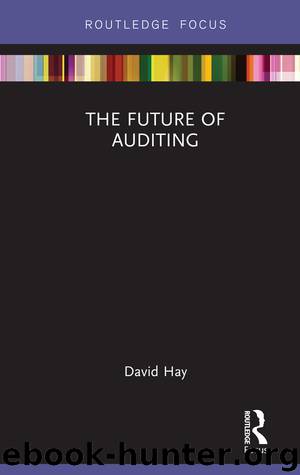The Future of Auditing by Hay David;

Author:Hay, David;
Language: eng
Format: epub
Publisher: Taylor & Francis (CAM)
Published: 2019-06-11T16:00:00+00:00
D Global or national auditing
Globalization of auditing is a longstanding trend, but it is not without complications, and these appear to be increasing. Auditing has been an international activity for a long time, arguably since British auditors were engaged to report to British investors on the audits of American companies in the nineteenth century (Maltby, 2009, 237). Since then, the influence of the global firm networks has been important, and in recent years, international standards and cooperation between the International Auditing and Assurance Standards Board and the US Public Company Accounting Oversight Board have made most areas of auditing fairly similar around the world. The extent to which auditing globally can reach convergence appears to be reaching its limits, however. Important issues are variations in how auditing practices are applied in different cultural settings, and the collision of different regulatory bodies, especially regarding inspection of auditing work.
Francis (2011) points out that although there are global accounting firms, they are each made up of country-specific partnerships. Each country has its own systems of education, licensing, and regulation, and more subtle differences in areas such as the extent to which auditors will be skeptical. The education of auditors, cultural differences, and varying perceptions of the function of auditing across countries, as well as the legal framework and the political, economic, and business framework, are likely to make auditing very different according to what country it is practiced in (Francis, 2011, 321). As a result, it is not likely that the quality of auditing is the same everywhere – or that research findings are generalizable, either (Francis, 2011). Part of the role of the International Auditing Standards (ISAs) is to ensure standardization, but their application nevertheless depends on local interpretations (Humphrey, Loft, and Samsonova-Taddei, 2014).
Studies that examine auditing across countries have shown that when different countries are compared, audit fees reflect variations in the legal regime and the exposure of auditors to litigation risk (Choi, Kim, Liu, and Simunic, 2008; Jaggi and Low, 2011; Srinidhi, Hossain, and Lim, 2012). Nikkinen and Sahlström (2004) demonstrate that the agency theory can explain international variations in audit pricing. Other influences include rules on disclosure and regulation (Taylor and Simon, 1999), culture and trust in society (Knechel, Mintchik, Pevzner, and Velury, 2018), and the overall level of development of a country (Chung and Narasimhan, 2002). Eierle, Hartlieb, Hay, Niemi, and Ojala (2018) report that litigation risk in a jurisdiction, the general trust in major companies within a society, and the market share of Big 4 audit firms influence differing levels of auditing fees among countries. Stronger investment protection increases the earnings quality of reports audited by Big 4 audit firms (Francis and Wang, 2008), whereas there is evidence that market concentration within the group of Big 4 works in the opposite direction and is associated with reduced quality (Francis, Michas, and Seavey, 2013).
Studies of the audit profession in emerging market countries show that audit quality is higher in countries with a more developed auditing profession (Michas, 2011, 1731).
Download
This site does not store any files on its server. We only index and link to content provided by other sites. Please contact the content providers to delete copyright contents if any and email us, we'll remove relevant links or contents immediately.
Harry Potter and the Goblet Of Fire by J.K. Rowling(3046)
Never by Ken Follett(2882)
Shadow of Night by Deborah Harkness(2718)
Ogilvy on Advertising by David Ogilvy(2682)
Zero to IPO: Over $1 Trillion of Actionable Advice from the World's Most Successful Entrepreneurs by Frederic Kerrest(2396)
The Man Who Died Twice by Richard Osman(2300)
Machine Learning at Scale with H2O by Gregory Keys | David Whiting(2292)
Book of Life by Deborah Harkness(2263)
How Proust Can Change Your Life by Alain De Botton(2261)
My Brilliant Friend by Elena Ferrante(2224)
0041152001443424520 .pdf by Unknown(2220)
The Tipping Point by Malcolm Gladwell(2204)
How to Pay Zero Taxes, 2018 by Jeff A. Schnepper(2100)
Will by Will Smith(2043)
Purple Hibiscus by Chimamanda Ngozi Adichie(1982)
Hooked: A Dark, Contemporary Romance (Never After Series) by Emily McIntire(1960)
Borders by unknow(1785)
Rationality by Steven Pinker(1765)
Daughter of Smoke and Bone by Laini Taylor(1744)
